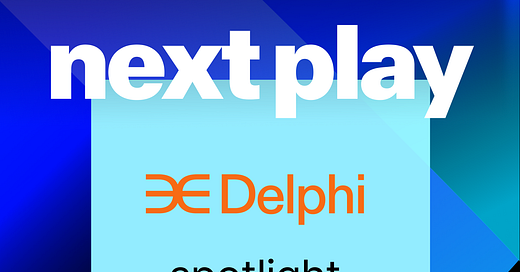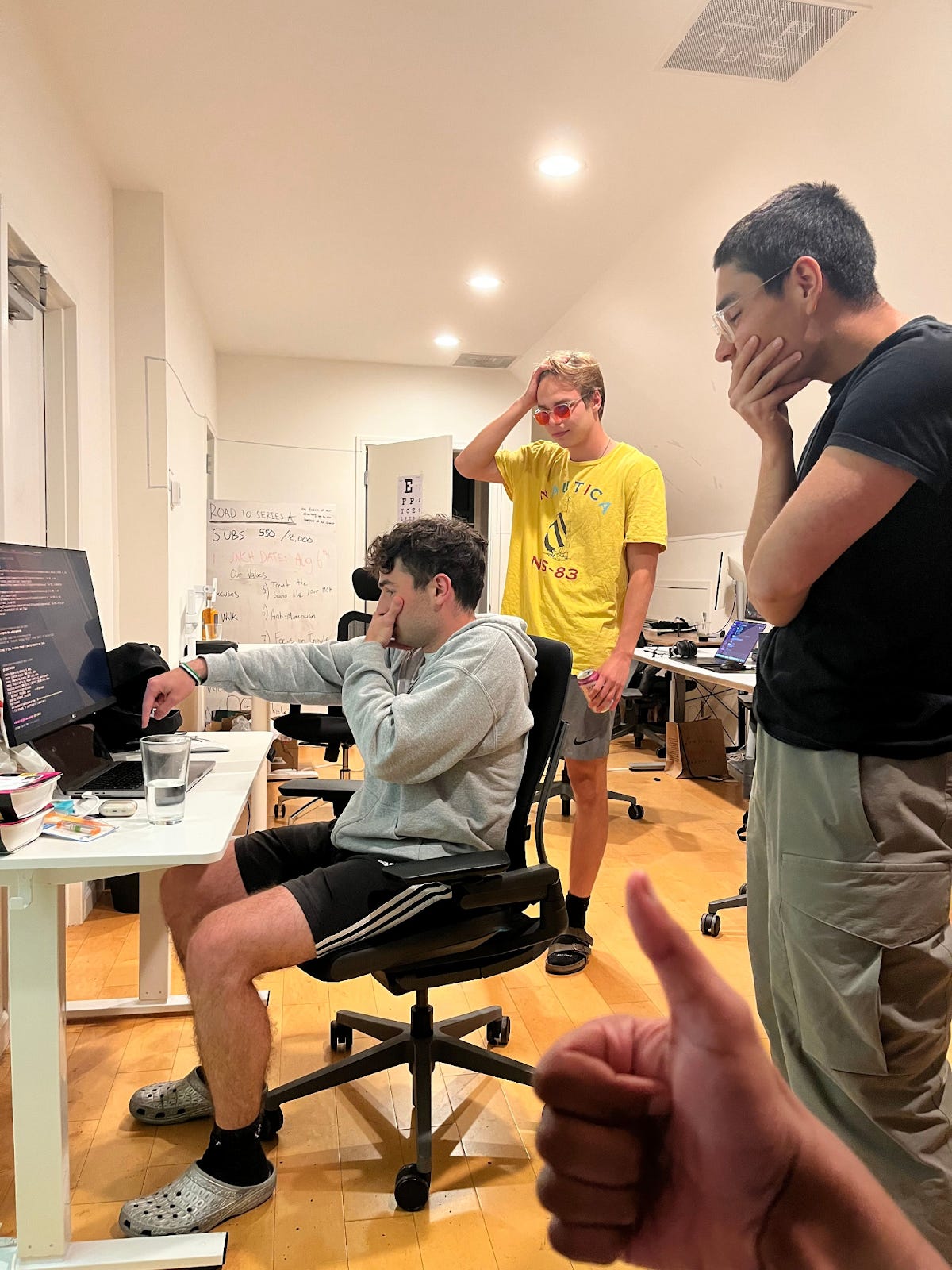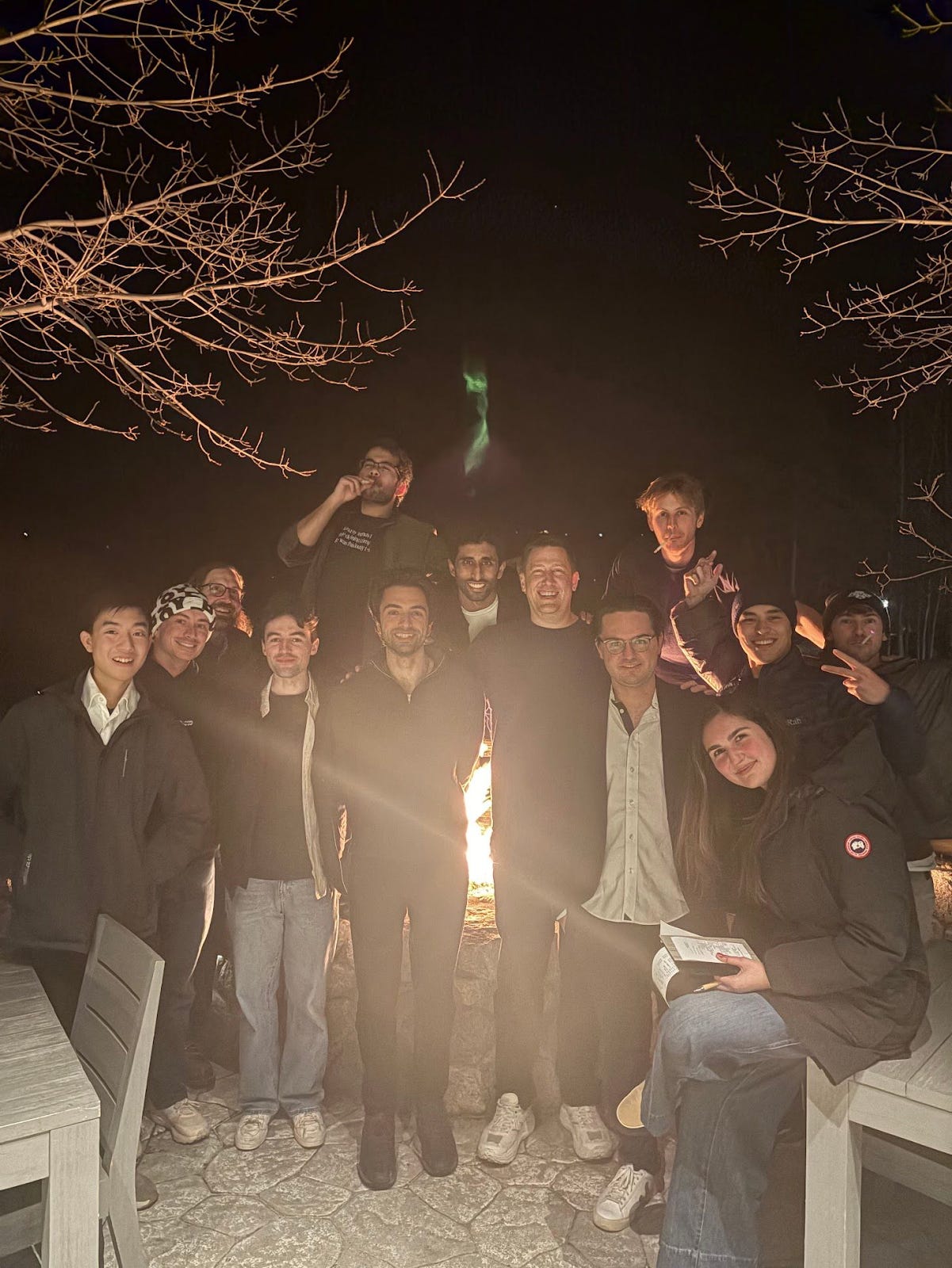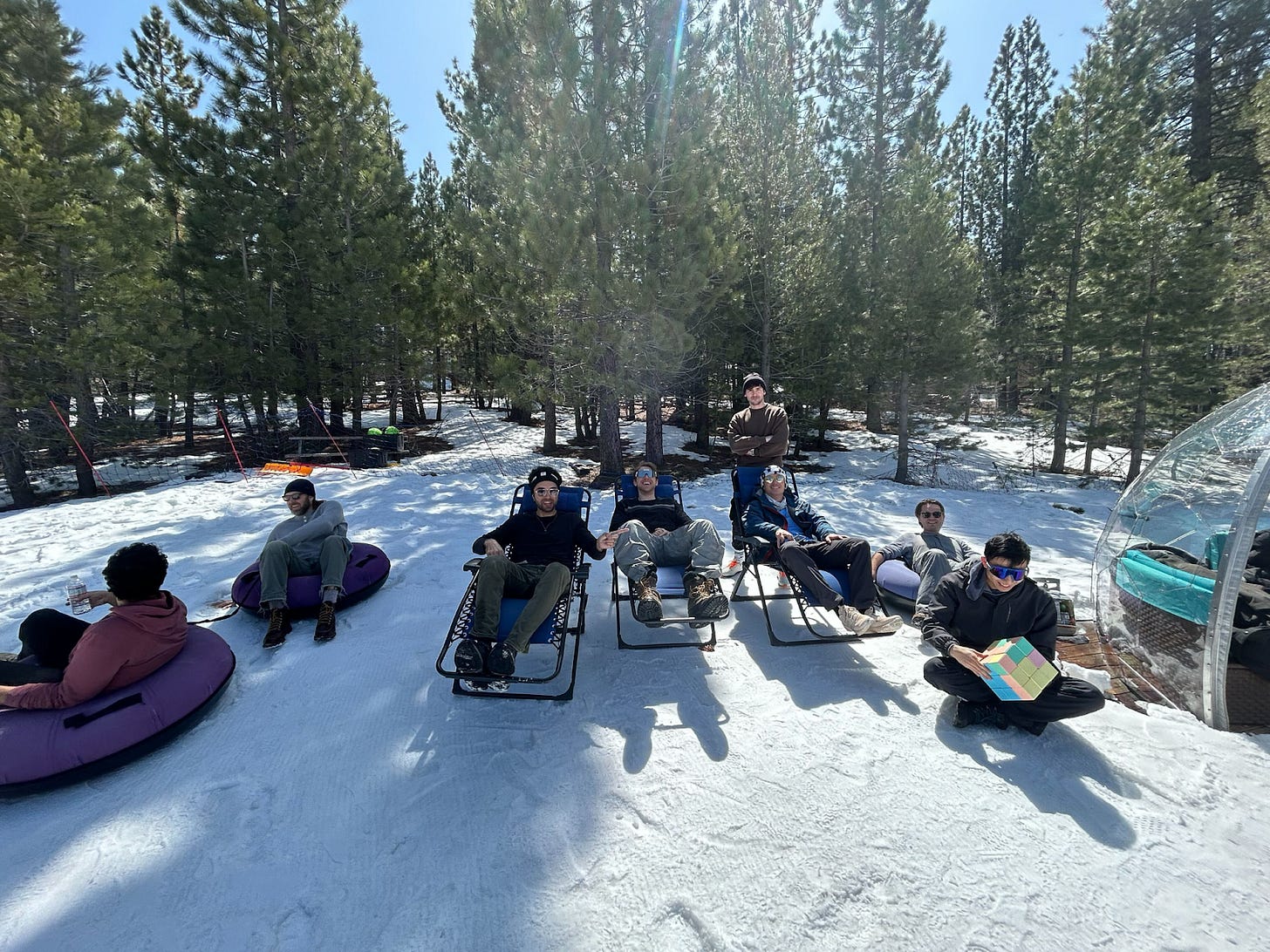How to build an AI company in a new market
Behind-the-scenes with Delphi and their vision to build a digital mind
✨ Hey there this is a free edition of next play’s newsletter, where we share under-the-radar opportunities to help you figure out what’s next in your journey.
It is hard to predict the future - but there are at least two ways to react to new emerging technologies like AI and try to think about how they may change the world.
The first is more straightforward. Simply look at large existing industries—like finance, healthcare, etc.—and figure out how this new technology can help automate frictionful processes to reduce costs and result in a better end customer experience. In the past few weeks, we have covered several startups taking this sort of approach.
The second lens requires a bit more vision and perhaps imagination. It’s thinking about new technology as a vehicle for opening up brand new categories—things that have never existed before that are now possible as a result of some sort of big innovation. For an obvious example, there were not really any mobile apps before mobile became sufficiently low cost and accessible, and now some of the biggest companies in the world make most of their money on mobile.
This type of company—the one that defines a brand new market—is, in many ways, harder to get right because there is far less of a status quo to lean on, and there’s a lot more you have to invent.
But when you do “get it right” and find product-market fit in a brand new category, you end up with many big advantages. There is far less competition. You get to build a huge headstart before anyone else. And because you are first, your brand often becomes synonymous with the category, so you have the opportunity to build really sticky relationships with your customers.
There’s not many startups we meet that make convincing pitches as to why they have successfully opened up a new market. It’s one thing to talk about an idea of the future—it’s another thing entirely to actually build it. But Dara Ladjevardian, the cofounder and CEO of Delphi, has made a pretty compelling case for why the Delphi team is well on their way. They have tripled revenue since January, and are being pulled by the market in all sorts of exciting directions.
What are they building? He describes it as “A digital version of your mind that people can talk to, learn from, and you can get insights from. More like an interactive personal profile than a chatbot.”
You can see Dara’s Delphi profile here.
Because it’s not exactly obvious, here is how using Delphi works: You start by linking your existing content - writing, videos, podcasts, books - to a self-updating Digital Mind that people can call, text, or video chat with. Delphi matches the way you speak, write, and think, so when someone has a conversation with your Delphi, it feels kinda like they're talking with you.
This pitch has led to thousands of customers (primarily people like coaches, business owners, consultants,influencers and professors) as well as backing from investors like Sequoia, Menlo, Founders Fund, Lux Capital, and many others. And they’ve done this all with a pretty lean team (yes they are hiring in engineering, growth, people, design, and more).
We thought it’d be useful to go behind the scenes with the Delphi team—to specifically learn a bit more about what it’s like to work at the company, how they got here, and where they are headed.
Major thanks to the Delphi team for sharing behind-the-scenes details and supporting Next Play.
Inventing a new type of product in a brand new market using a new type of technology requires vision.
Some of the most influential companies come from unexpected places and are not exactly obvious or popular immediately.
“The most valuable knowledge is contrarian and correct – it’s what no one else believes but is true.”
It’s easy to look at other people’s vision for inspiration—but rarely does that lead somewhere very innovative.
“We did not start Delphi because of AI hype. It came from a personal problem, and AI just happens to enable it.”
Delphi was born from a very personal experience for Dara.
“In 2021, as I navigated my first startup without mentors, I desperately wished I could ask questions of my grandfather, a business titan who once employed 30,000 people before losing everything in Iran's 1979 revolution. His stroke in 2019 had made conversation impossible, but luckily his memoir held untapped wisdom. Inspired by a book I read in 2014 by Ray Kurzweil, I created a digital version of his mind that I could talk to and actually get advice from.”
He’s taken this experience as inspiration for the plan behind Delphi.
“Dara is one of the clearest, most intentional thinkers I’ve worked with. He has a rare ability to hold both the big vision and the small details and move between them with speed and precision. He cares deeply about the why behind everything.”
By communicating a clear vision, Dara and his cofounder Sam have been able to recruit a uniquely mission-aligned team. Optimizing for mission-alignment may be an important aspect of building a product in a brand new category. They explicitly hire missionaries, not mercenaries.
People who are excited by the long-term vision for the product.
“If you want to help build something that actually feels new, this is that. Delphi isn’t just another SaaS company. We’re creating a new category: Digital Minds (and conversational media).”
“Someone who could be a good fit is someone who wants to build something for humanity that will outlast them. Our product is a bit of consumer sci-fi which appeals to anyone who might want a company that ends as either trajectory-defining for the universe or nothing at all.”
People who consider work as a big aspect of their life.
“Anyone who wants to do their life's best work and put their soul into a project to see what comes of chasing their true potential.”
“Also, if you’re just looking for a job, not a mission, it might not click. This place works best for people who care about what we’re building and want to be part of shaping it.”
“Anybody that doesn't think your work can be a source of pride and joy is probably not a fit. I get it, many occupations aren't fulfilling, but sometimes that causes people to overfit to rigid ideals around "work" and "living". We only want people who really love what they do and don't come in trying to separate those two things.”
“Delphi is not for people who are trying to cruise through life. You come here to do your life's best work and make the necessary sacrifices to win. The balance comes from self awareness and managing your breaks to achieve highest output in the long run.”
People who will become super users of their own product.
“Start by spending as much time in Delphi Studio itself as possible. Click every button in Studio, try weird things just to see what happens, and peek into the support inbox - maybe even draft a few replies. Ultimately, you should know our product 100x better than any customer.”
People who can think really big picture—not just optimize for the next funding round but actually care about the long-term impact of their work.
“You should try and understand the big picture—where we need to be by the end of this week, this month, this year, the next 3 years.”
People who bring optimism to hard problems.
“I think to thrive at Delphi - and maybe any AI startup - it's helpful to be optimistic about where the world can go with all the new technologies and paradigms emerging. Being pessimistic and fearful of the future makes people conservative, and that's likely not the right mindset for moonshots - which is what Delphi is doing.”
People who are really willing to do whatever it takes to make the vision a reality.
“19/20 people in the company moved to San Francisco for the company - speaks to the commitment and passion people have for what we are doing.”
The leadership at Delphi seems to care far more about results than they do about traditional pedigree.
If you hire people who are too stuck in the status quo, it can be hard to be inventive or creative.
“If you’re attached to titles, rigid hierarchy, or staying strictly inside your lane, this might feel uncomfortable. We collaborate cross-functionally all the time, and we all wear multiple hats. The people who succeed here are flexible and proactive.”
But many people at Delphi come from rather unconventional backgrounds:
“Our first hire was a 17 year old and he's designed every single thing you see on Delphi. Some people compliment us for our amazing design - and it literally all has been Matin.”
“Our founding backend engineer had no previous professional engineering experience. We bet on him and he's crushing it now.”
They bet on people’s growth and invest in their potential.
“We encourage every engineer that touches frontend to go through this animations course (we cover the cost)”
“We encourage every engineer to learn prompt engineering.”
“We have some of the best minds in the world giving talks at the office (founders fo Doordash, youtube, etc).”
And they’ve succeeded, and been given tremendous responsibility to make an impact.
“People that love owning ambiguous and ambitious outcomes would thrive in this role as there is zero precedent for the space we are working in - we're creating an entirely new market and there is substantial unbiased momentum.”
“People who need a lot of structure, or who prefer being told exactly what to do, probably won’t thrive at Delphi right now. We’re still early. There are shifting priorities, fast pivots, and sometimes more questions than answers. You have to be okay with ambiguity and take initiative without waiting for permission.”
There is an intense focus on getting things done.
“We run on what I like to think of as productive urgency: every teammate feels the clock ticking and takes full ownership of their slice of the mission.”
“The founders and team had the intensity I felt was lacking from every environment I had been in previously.”
Because they are nearly all in person, they are able to balance that focus with hanging out and sharing ideas.
“Intense, but somehow also extremely relaxed. It fully embodies "work hard play hard", nobody doubts anybody else's dedication to the product, so when things are fun it's never at the expense of that intensity.”
“We had a team offsite in Tahoe and decided to take a break by going for a cold plunge in the lake (it was early April). Feeling alive and accomplished, we went to find an après-ski party before the team dinner.”
“People pause for lunch chats, celebrate launches with team dinners, and swap ideas freely across roles.”
“A few of us joined a soccer team as part of a league that ran from January to March.”
In summary, I think what really stands out about Delphi is how aligned they are on their mission.
“Others are focused on automating humans, we are focused on preserving and scaling humans.”
Nearly every person we spoke with brought up the long-term vision for the company as a big motivator as to why they (and perhaps you?) joined the company.
“Join Delphi if you want to help invent something your friends will actually use: digital minds that let anyone tap into expert wisdom on demand. We’re a lean team where you can ship ideas fast, see real users light up, and learn more in six months than most places in years - all while working on a mission that feels genuinely fresh and exciting.”
“There aren't many opportunities to be a part of a product that can touch everyone in the world. We aspire to be the platform for humanity, hosting the digital minds of those both alive and dead. Delphi creates a new medium of communication that has never existed before. One that is both personalized and theoretically infinitely scalable. This is the chance to contribute to a business that will fundamentally change how we interact.”
They are also hiring for many roles in SF across engineering, design, marketing, and people. Apply here.
And if you are looking to explore more opportunities, be sure to check out Next Play.








✨✨✨
love Delphi. 🤩🤩
thanks for publishing this